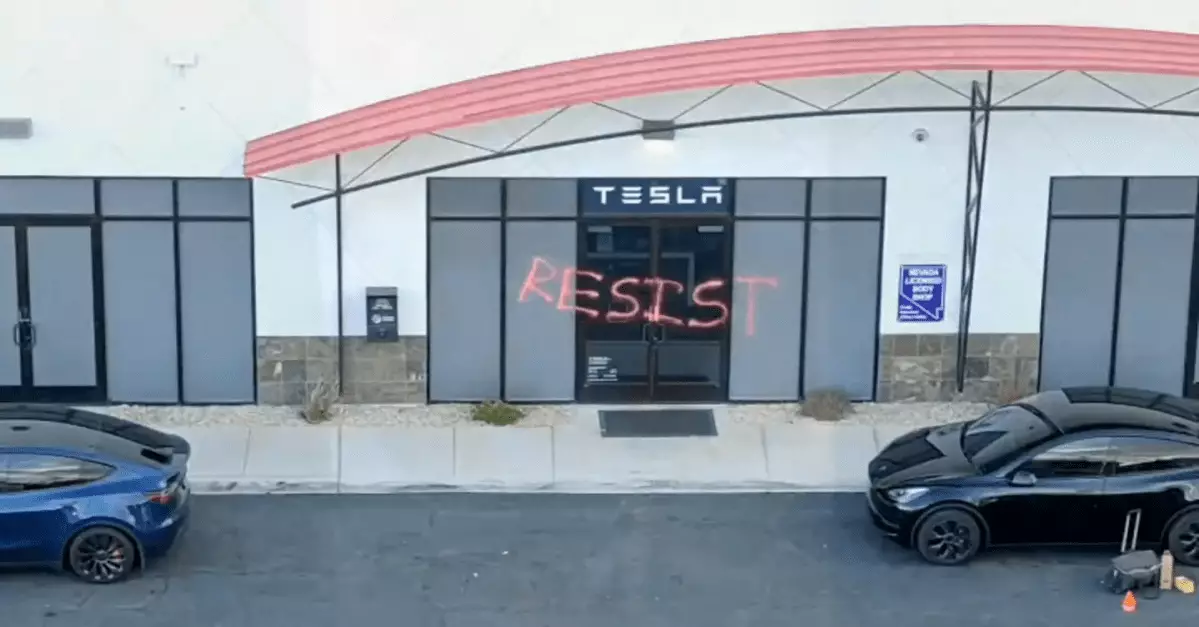In recent weeks, the situation surrounding electric vehicle maker Tesla has taken a sinister turn. Incidents of vandalism targeting Tesla vehicles have emerged, not as isolated acts of defiance but as an alarming escalation that some authorities are now considering classifying as domestic terrorism. The alarming frequency and nature of these attacks have raised questions not only about public safety but also about the broader implications of escalating anti-Tesla sentiment within our society.
One shocking event unfolded in Las Vegas, where a perpetrator clad in black deliberately attacked a Tesla collision center with Molotov cocktails and gunfire, defacing the property with incendiary messages like “resist.” This brazen act prompted swift intervention from local police, and ultimately caught the attention of the FBI’s joint terrorism task force. The incident has forced many to reckon with a troubling question: what drives an individual to target a company that primarily aims to foster sustainable energy practices?
Elon Musk’s Response and the Rising Stakes
Tesla’s charismatic CEO, Elon Musk, quickly labeled the attacks as acts of terrorism, asserting that the company’s mission is strictly about creating electric vehicles and not engaging in any nefarious activities deserving of such violent backlash. Musk’s reaction underscores a critical point: the narrative surrounding electric vehicles and sustainability has become deeply divisive. As Tesla continues to revolutionize the auto industry, the resentment towards it may reflect broader societal anxieties about change, technological advancement, and a shift away from traditional fossil fuels.
The flame of hatred is not just limited to Las Vegas. In Kansas City, a strikingly similar incident transpired when a Cybertruck caught fire in a Tesla parking lot, igniting panic not only among witnesses but also within the police department. This occurrence highlights the potential dangers and unpredictability involved when tensions run high—not just for the targeted company, but for innocent bystanders and emergency responders who must navigate these volatile situations.
Decoding the Ideological Motivations
Understanding the underlying motivations behind such acts of violence is essential. The backlash against Tesla can be seen as a reflection of societal resistance to change, particularly in an era where sustainability and innovation are being thrust into the spotlight. Many individuals may feel threatened by the disruptions that new technologies can bring to their livelihoods—especially in industries that have traditionally relied on fossil fuels.
Furthermore, the label of “terrorism” adds a significant layer of gravity to the discourse surrounding these incidents. It prompts broader societal reflection on what constitutes domestic terrorism in the face of dissent. If an individual vandalizing property can be viewed as a terrorist act, what does that mean for the multitude of protests and movements that arise from frustration and anger directed towards corporate giants or government policies?
The ongoing saga of Tesla vandalism, and its potential classification as domestic terrorism, serves as a microcosmic reflection of societal rifts, unsettling anxieties about change, and questions of safety in the modern world. As actions escalate, it is crucial for discussions surrounding these events to encompass not just the acts themselves, but the emotions and ideologies fueling them. Whether viewed as terrorism or vandalism, the implications can no longer be ignored.


Leave a Reply